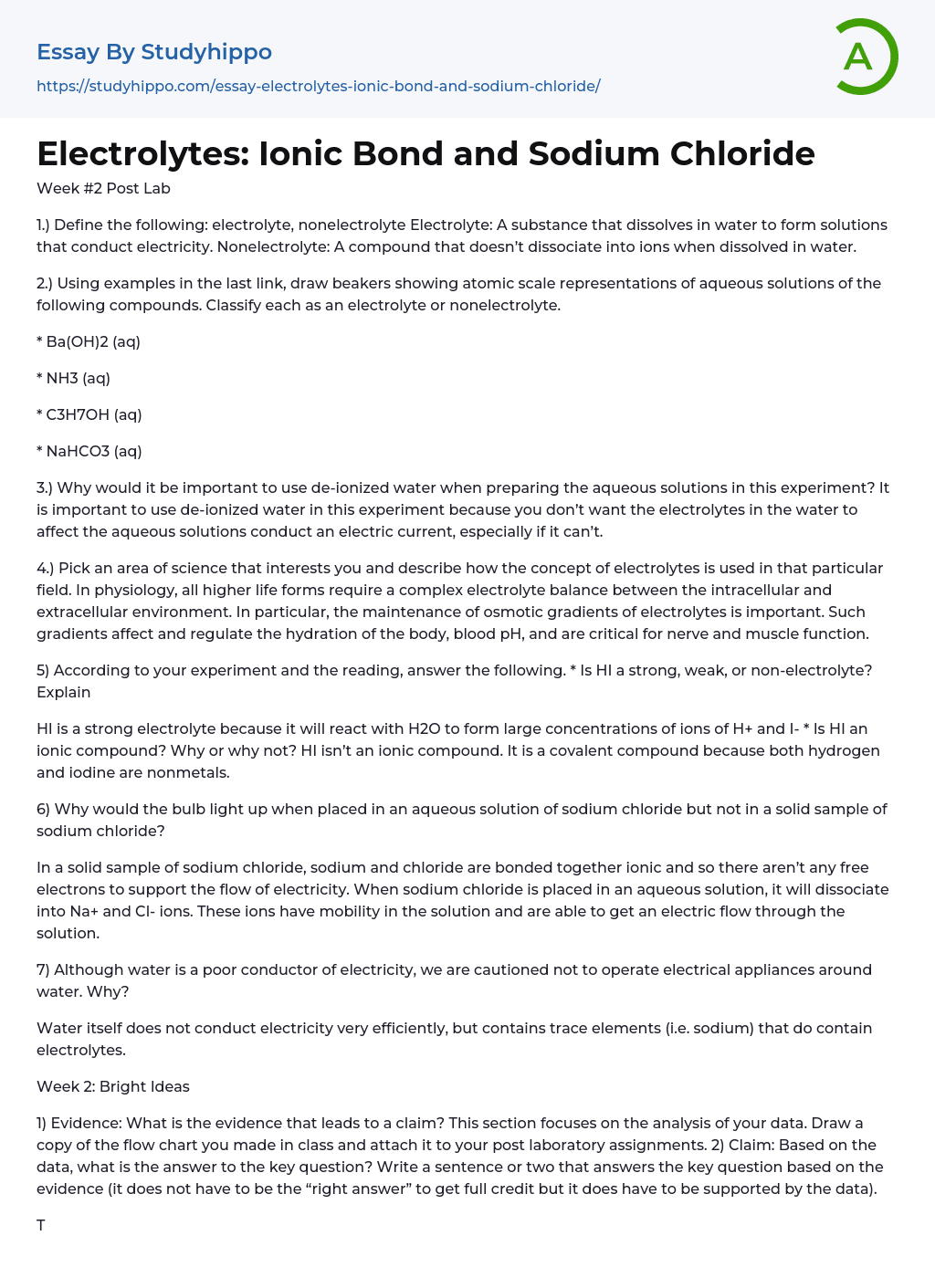

Electrolytes: Ionic Bond and Sodium Chloride Essay Example
Define the following: electrolyte, nonelectrolyte Electrolyte: A substance that dissolves in water to form solutions that conduct electricity. Nonelectrolyte: A compound that doesn’t dissociate into ions when dissolved in water.
Using examples in the last link, draw beakers showing atomic scale representations of aqueous solutions of the following compounds. Classify each as an electrolyte or nonelectrolyte.
- Ba(OH)2 (aq)
- NH3 (aq)
- C3H7OH (aq)
- NaHCO3 (aq)
Why would it be important to use de-ionized water when preparing the aqueous solutions in this experiment? It is important to use de-ionized water in this experiment because you don’t want the electrolytes in the water to affect the aqueous solutions conduct an electric current, especially if it ca
...n’t.
Pick an area of science that interests you and describe how the concept of electrolytes is used in that particular field. In physiology, all higher life forms require a complex electrolyte balance between the intracellular and extracellular environment. In particular, the maintenance of osmotic gradients of electrolytes is important. Such gradients affect and regulate the hydration of the body, blood pH, and are critical for nerve and muscle function.
According to your experiment and the reading, answer the following. Is HI a strong, weak, or non-electrolyte? Explain
HI is a strong electrolyte because it will react with H2O to form large concentrations of ions of H+ and I- Is HI an ionic compound? Why or why not? HI isn’t an ionic compound. It is a covalent compound because both hydrogen and iodine are nonmetals.
Why would the bulb light up when placed in an aqueous solution
of sodium chloride but not in a solid sample of sodium chloride?
In a solid sample of sodium chloride, sodium and chloride are bonded together ionic and so there aren’t any free electrons to support the flow of electricity. When sodium chloride is placed in an aqueous solution, it will dissociate into Na+ and Cl- ions. These ions have mobility in the solution and are able to get an electric flow through the solution.
Although water is a poor conductor of electricity, we are cautioned not to operate electrical appliances around water. Why? Water itself does not conduct electricity very efficiently, but contains trace elements (i.e. sodium) that do contain electrolytes.
- John Locke essays
- 9/11 essays
- A Good Teacher essays
- A Healthy Diet essays
- A Modest Proposal essays
- A&P essays
- Academic Achievement essays
- Achievement essays
- Achieving goals essays
- Admission essays
- Advantages And Disadvantages Of Internet essays
- Alcoholic drinks essays
- Ammonia essays
- Analytical essays
- Ancient Olympic Games essays
- APA essays
- Arabian Peninsula essays
- Argument essays
- Argumentative essays
- Art essays
- Atlantic Ocean essays
- Auto-ethnography essays
- Autobiography essays
- Ballad essays
- Batman essays
- Binge Eating essays
- Black Power Movement essays
- Blogger essays
- Body Mass Index essays
- Book I Want a Wife essays
- Boycott essays
- Breastfeeding essays
- Bulimia Nervosa essays
- Business essays
- Business Process essays
- Canterbury essays
- Carbonate essays
- Catalina de Erauso essays
- Cause and Effect essays
- Cesar Chavez essays
- Character Analysis essays
- Chemical Compound essays
- Chemical Element essays
- Chemical Substance essays
- Cherokee essays
- Cherry essays
- Childhood Obesity essays
- Chlorine essays
- Classification essays
- Cognitive Science essays



